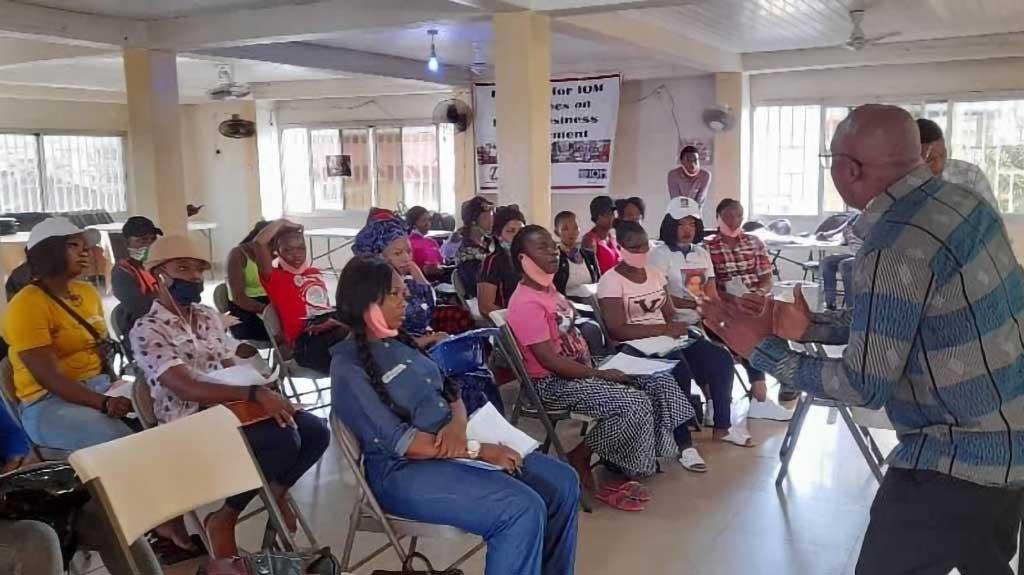Weekly News Report: November 2-8, 2020
02/11/2020
Reintegration Process for Sierra Leonean Women Evacuated from Lebanon. Photo from IOM
Articles and views shared in the Weekly News Report do not represent ARM’s views. Information in these articles has not been fact-checked by ARM and may contain some errors. ARM is simply compiling all news relevant to migrant communities to inform our advocacy efforts and to facilitate the work of organizations who cater to migrant communities.
Evacuation Updates
More Ethiopian Workers Evacuated [here] and [here]
The Ethiopian consulate announced on Facebook that 208 Ethiopian women were evacuated between November 2 and 4.
Among those, 90 women traveled with the support of Egna Legna who also announced that they have successfully supported 216 Ethiopian women so far to travel back home [here].
Reintegration of Sierra leonean Women Launched by IOM [here]
The reintegration process of Sierra Leonean women evacuated from Lebanon was started by the International Organization for Migration (IOM) on november 3. The process started by holding training sessions for business skills and income-generating activities.
Standard Unified Contract
Report on SUC Block by Al Jazeera [here]
A video by Al Jazeera English on the block of the Standard Unified Contract (SUC) by the Council of State included interviews with Egna Legna who cited relief work as the only option as long as legal protection is still not provided to migrant domestic workers, ARM who cited the step as dangerous precedent for future activism to abolish Kafala, and the International Labor Organization who cited unpaid wages as the major problem facing migrant domestic workers.
Report on SUC Block by the Independent Arabia [here]
An article by the Independent Arabia reported that the Council of State accepted the suit filed by the Syndicate of the Owners of Recruitment Agencies in Lebanon (SORAL) to block the SUC based on 12 legal reasons. Most notably, domestic work is not included in the Labor Law, and the caretaker status of the government does not allow the Minister of Labor to impose decisions that have to do with legal documents such as contracts.
Other
Report on Situation of Migrant Domestic Workers by Washington monthly [here]
An article by Washington monthly reported on the abuses of migrant domestic workers under Kafala before and after the explosion of the Beirut port. The article stated that there are approximately 800 legal recruitment agencies, and included testimonies of two Ghanaian domestic workers who were subjected to severe abuse and exploitation by employers.
Report on the Case of Trafficked Ethiopian Worker by Kafa [here]
Kafa Organization reported on the case of an 18-year old Ethiopian worker whom they supported after fleeing her employer’s house last year, by filing a lawsuit against him. The woman traveled back to Ethiopia around 2 weeks ago without any progress in her file at the court. The employer was allowed a bail without being arrested. The article emphasized the shortcoming of the judicial system in this particular case which focused on the rape as the main issue as opposed to looking at the systemic aspect that allowed trafficking and sexual assault in the first place.
Report on Situation of Migrant Workers Post-Explosion by IOM [here]
A video by the International Organization for Migration (IOM) reported the relief and solidarity efforts by several migrant communities following the explosion of the Beirut port. The video also included reports of their situation under the Kafala system, and featured activists from the Kenyan, Cameroonian and Ethiopian communities.
HRW Submits Report on the Committee on the Elimination of Discrimination against Women [here]
Human Rights watch (HRW) submitted a report on November 4 to the Committee on the Elimination of Discrimination against Women in Lebanon which included a section on migrant doemstci workers. The section detailed the abuse of workers enabled by the Kafala system especially during the lockdown, and the inaction of the Lebanese state to put an end to it despite passing the SUC which has been blocked. HRW recommended the committee addresses the Lebanese government with a set of questions as mentioned in the report.
Related Posts
Have Any Questions?
To inquire about this statement and the context, email us or fill the form.
Join Our Newsletter
At the Anti-Racism Movement (ARM), we are constantly working on a multitude of different activities and initiatives. Most of our activities are only possible with the help of dedicated and passionate volunteers who work in collaboration with our core team.
The Anti-Racism Movement (ARM) was launched in 2010 as a grassroots collective by young Lebanese feminist activists in collaboration with migrant workers and migrant domestic workers.
Quick Links
Useful Links
This work is licensed under a Creative Commons Attribution 4.0 International License.
Developed by CONCAT
